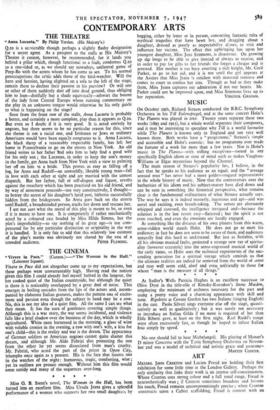CONTEMPORARY ARTS
THE THEATRE
"Anna Lucasta." By Philip Yordan. (His Majesty's.) Q.20 is a serviceable though perhaps a slightly flashy designation for a secret agent. As a passport to the stalls at His Majesty's Theatre it cannot, however, be recommended, for it lands you behind a pillar which, though functional to a fault, condemns Q.2o to a one-sided or, as we should say nowadays, unilateral game of Peep-Bo with the actors whom he has come to see. To his normal preoccupations the critic adds those of the bird-watcher. Will the hero and heroine, having alighted on a sofa to the left of the stage, remain there to declare their passion in his purview? Or will one or other of them suddenly dart off into dead ground, thus obliging him to lean—dutifully but a shade equivocally—athwart the bosom of the lady from Central Europe whose running commentary on the play in an unknown tongue would otherwise be his only guide to what is happening on the stage?
Seen from the front row of the stalls, Anna Lucasta is probably a better, and certainly a more complete, play than it appears to Q.2o. But even so I doubt if it is very good. It is. acted entirely by negroes, but there seems to be no particular reason for this, since the theme is not a racial one, and Irishmen or Jews or ordinary Americans would have been equally congruous to it. Anna Lucasta, the black sheep of a reasonably respectable family, has left her home in Pennsylvania to go on the streets in New York. An old friend writes to her father Ind asks him to help find a good wife for his only son ; the Lucastas, in order to keep the son's money in the family, get Anna back from New York with a view to palming her off on him as a bride. This proves as easy as falling off a Jog, for Anna and Rudolf—an unworldly, likeable young man—fall in love with each other at sight and are married with the utmost dispatch. But her father, full of self-disgust and liquor, revolts against the treachery which has been practised on his old friend, and by way of atonement proceeds—not very constructively, I thought— to betray the secret of his daughter's lurid past, hitherto successfully hidden from the bridegroom. So Anna goes back on the streets until Rudolf, a broadminded person, tracks her down and rescues her.
I am not sure what the moral of this play is meant to be, or even if it is meant to have one. It is competently if rather mechanically acted by a coloured cast headed by Miss Hilda Simms, but the plot's improbability—to say nothing of its great age—is not com- pensated for by any particular distinction or originality in the way it is handled. It is only fair to add that this relatively low estimate of the play's merits was obviously not shared by the rest of a


































 Previous page
Previous page